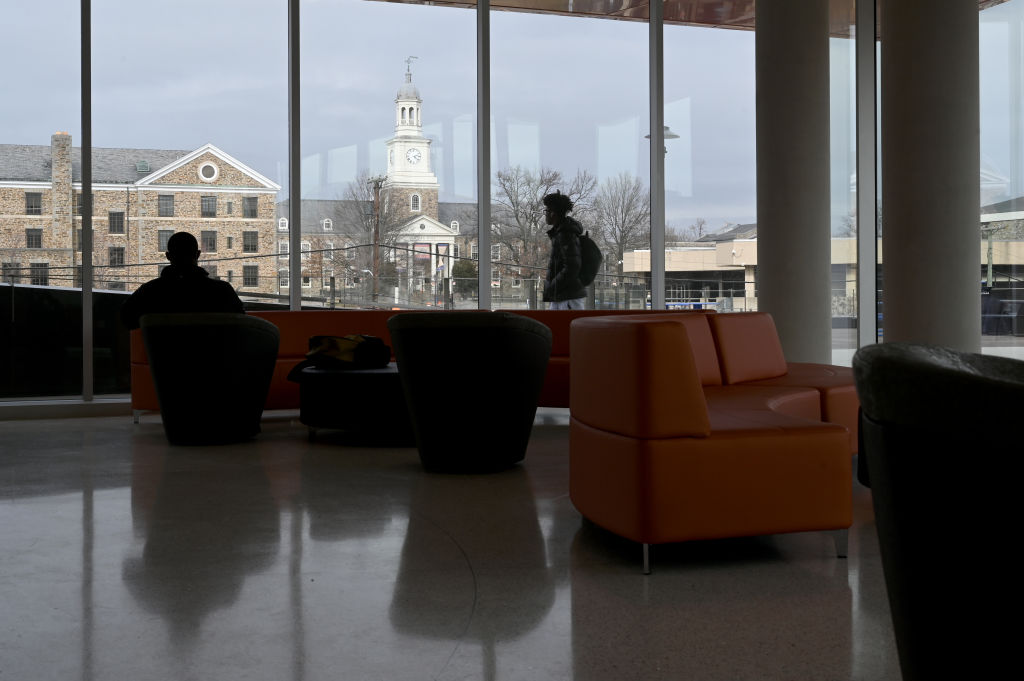A Wake-Up Call for HBCUs: The Trump Administration’s Impact On Funding And Legacy

Tyler Hall at Morgan State University looks out over Holmes Hall and other buildings on campus on February 7, 2022, in Baltimore, Maryland. | Source: The Washington Post / Getty
Historically Black Colleges and Universities (HBCUs) have been pillars of higher education for Black Americans for over 150 years. These institutions were born out of necessity in a segregated America, providing access to education for Black students who were systematically excluded from predominantly white institutions (PWIs). Despite their critical role in fostering social mobility and economic empowerment, HBCUs have faced chronic underfunding for decades that persisted and, in some ways, worsened during Donald Trump’s presidency. While his administration made some strides, such as signing the FUTURE Act into law, many of its budget proposals threatened the financial stability of these institutions. This article serves as a wake-up call to highlight the ongoing funding challenges HBCUs face and to call for urgent action.
A personal journey: From Pell Grants to graduate school
I know firsthand how critical federal support is for students attending HBCUs. Raised by a single mother who worked tirelessly to provide for our family, I relied on Pell Grants and work-study programs to pursue my education—programs that were not just financial lifelines but essential tools that allowed me to stay in school. When I started graduate school at Jackson State University, I had only $60 in my pocket and a full tank of gas—barely enough to get by. For weeks, I lived off dollar-menu items at fast-food restaurants while waiting anxiously for my federal aid to come through so I could afford books, tuition, and basic living expenses. Without Pell Grants and federal work-study programs, I wouldn’t have been able to earn my degree or pursue a career advocating for others. My story is not unique; it mirrors that of thousands of students who attend HBCUs across the country. These institutions are often the only affordable option for low-income students seeking higher education. However, they cannot continue serving this vital role without adequate funding.
The legacy of underfunding
The financial struggles of HBCUs are not new; they are part of a long history of systemic neglect. State governments have particularly short-changed public HBCUs. For example, Tennessee State University (TSU) was underfunded by approximately $544 million over 70 years due to Tennessee’s failure to meet its legal obligations under the Second Morrill Act of 1890. This act required states to match federal funds dollar-for-dollar for land-grant institutions, but many states ignored this mandate when it came to HBCUs. This pattern is widespread across the country. According to reports, 18 states owe public HBCUs over $12 billion in unpaid funds. This chronic underfunding has left many HBCUs with outdated infrastructure, limited resources for student services, and lower faculty salaries compared to their PWI counterparts. Despite these challenges, HBCUs continue to produce 13% of all bachelor’s degrees earned by Black students while making up less than 3% of U.S. colleges.
Trump’s mixed record on HBCU funding
During his presidency, Donald Trump made some high-profile gestures toward supporting HBCUs. In 2019, he signed the FUTURE Act into law, which secured $255 million annually for minority-serving institutions—including $85 million specifically earmarked for HBCUs.
This was a significant win and provided much-needed financial relief. However, Trump’s broader budget proposals painted a different picture. His FY 2018 budget proposed cuts to critical federal student aid programs that disproportionately affect HBCU students—such as Pell Grants and Federal Work-Study programs. Pell Grants are particularly crucial for low-income students attending HBCUs, and freezing their funding for over a decade has reduced their purchasing power. The proposed elimination of $733 million in Supplemental Educational Opportunity Grants (SEOGs), which supplement Pell awards for the neediest students, would have negatively impacted more than 55,000 HBCU students. Additionally, while Trump maintained level funding for Title III grants at $245 million per year—well below what advocacy groups like UNCF had requested—he eliminated funding for other critical programs like the HBCU Endowment Challenge Grants. These grants were designed to help build long-term financial stability at historically underfunded schools.
The economic impact of underfunding
Despite these financial challenges, HBCUs contribute significantly to the U.S. economy. A report from UNCF found that HBCUs generate $16.5 billion in economic impact annually and create more than 136,000 jobs nationwide. Graduates from these institutions can expect lifetime earnings that are 56% higher than those without an HBCU degree. Yet despite their outsized contributions, many HBCUs struggle with outdated facilities and limited resources due to decades of financial neglect. For instance, Howard University—a flagship among private HBCUs—has faced significant challenges maintaining its infrastructure due to insufficient state or federal support. Public HBCUs are even more vulnerable because they rely heavily on state funding that has historically fallen short.
A call to action
The Trump administration may have brought some attention to HBCUs through high-profile meetings with college presidents and signing key legislation like the FUTURE Act, but this was not enough. The legacy of underfunding persists—and more needs to be done if these institutions will thrive in the future. Advocacy groups like UNCF and Thurgood Marshall College Fund (TMCF) have repeatedly called for increased federal investment in Title III programs and Pell Grants—essential lifelines for low-income students attending HBCUs. Additionally, state governments must be held accountable for years of neglecting public HBCUs by failing to meet matching fund requirements set forth by federal law. The Biden administration has already taken steps toward addressing this issue by urging states to rectify a $12 billion funding gap between land-grant PWIs and their HBCU counterparts. However, sustained advocacy is needed at both state and national levels if we ensure equitable funding for these vital institutions.
Securing the future of HBCUs
HBCUs are more than just educational institutions—they are engines of social mobility and economic growth in Black communities across America. However, their future remains uncertain without adequate investment from both federal and state governments. Let this be a wake-up call: if we do not act now—by increasing federal support through Title III programs, holding states accountable for their financial obligations, and expanding access to Pell Grants—we risk losing one of our nation’s greatest assets in the fight for racial equity and social justice.
Duvalier Malone is the author of “Those Who Give A Damn: A Manual for Making a Difference,” a motivational speaker, community activist, and CEO of Duvalier Malone Enterprises, a global consulting firm. He lives in Washington, D.C.
SEE ALSO:
How The Underfunding Of HBCUs ‘Disadvantages’ Students And Faculty
Tennessee State University Hosts Protests After Governor Strips HBCU Of Its Board Of Trustees


